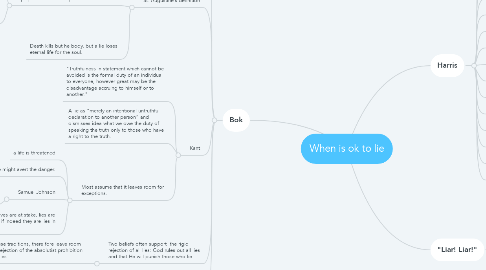
1. Bok
1.1. The simplest answer to the problems of lying, at least in principle, is to rule out all lies.
1.1.1. God forbids all lies and that liars therefore endanger their immortal souls.
1.2. St. Augustine's definition
1.2.1. "Lying as having one thing in one's heart and uttering another with the intention to deceive, thereby subverting the God-given purposes of human speech."
1.2.1.1. Three kinds of lies.
1.2.1.1.1. the officious, or helpful, lies
1.2.1.1.2. the jocose lies, told in jest.
1.2.1.1.3. the mischievous, or malicious, lies, told to harm someone.
1.2.1.2. "mental reservation" or "mental restraint"
1.2.1.2.1. If you say something mislead to another and merely add a qualification to it in your mind so as to make it true, you cannot be responsible for the "misinterpretation" made by the listener.
1.2.2. Death kills but he body, but a lie loses eternal life for the soul.
1.3. Kant
1.3.1. "Truthfulness in statement which cannot be avoided is the formal duty of an individual to everyone, however great may be the disadvantage accruing to himself or to another."
1.3.2. A lie as “merely an intentional untruthful declaration to another person” and dismisses idea what we owe the duty of speaking the truth only to those who have a right to the truth.
1.3.3. Most assume that it leaves room for exceptions.
1.3.3.1. a life is threatened
1.3.3.2. where a lie might avert the danger.
1.3.3.3. Samuel Johnson
1.3.3.3.1. The General Rule is, that truth should never be violated; there must, however, be some exceptions.
1.3.3.4. where innocent lives are at stake, lies are morally justified, if indeed they are lies in the first place.
1.4. Two beliefs often support the rigid rejection of all lies: God rules out all lies and that He will punish those who lie.
1.4.1. All these traditions, there fore leave room for a rejection of the absolutist prohibition of all lies.
1.5. The concern
1.5.1. The concern for the harm to trust and to oneself from lying, quite apart from any immediate effects from anyone lie.
1.5.1.1. Individuals, these thinker claimed, have to consider the long-range effects off lying on human communities.
1.5.1.2. Even if liars have no such forethought, the risks that they themselves run from lying ought to matter to them perhaps most of all.
